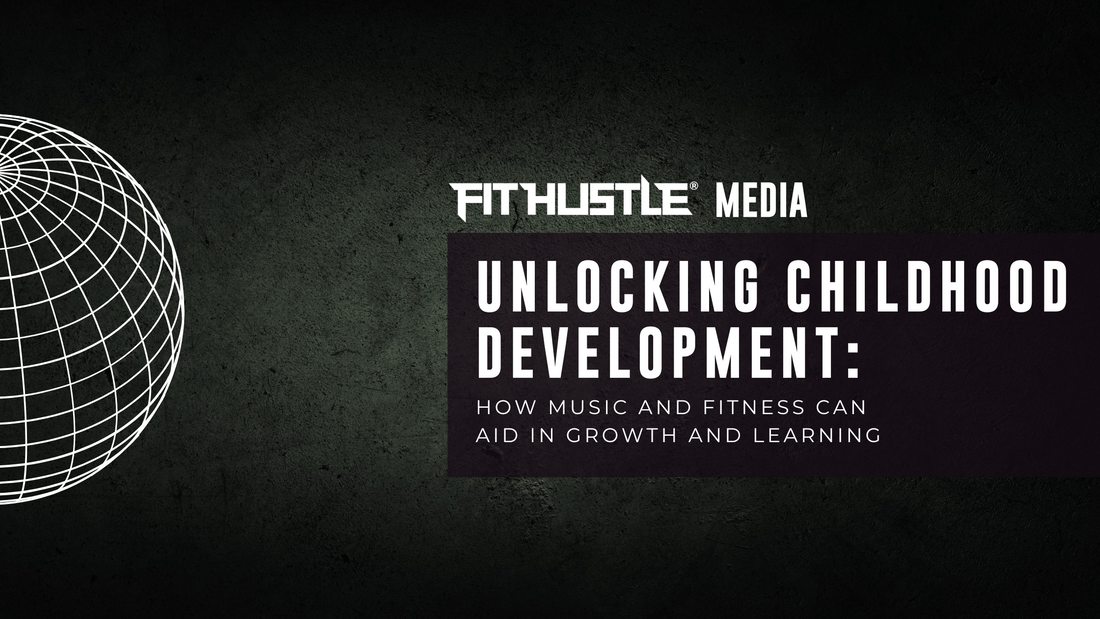
Unlocking Childhood Development: How Music and Fitness Can Aid in Growth and Learning
Share
Childhood development is a critical period in human development where the foundation for lifelong health and well-being is established. It is during this time that children learn to walk, talk, and interact with the world around them. In recent years, there has been growing interest in the role that music and fitness can play in aiding childhood development. In this blog, we will explore how music and fitness can aid in childhood development and how you can incorporate these activities into your child's life.
Music and Childhood Development
Music is a powerful tool that can help children develop in numerous ways. Research has shown that music can aid in the development of language, cognitive, and social-emotional skills.
Language Development
Music can help children develop language skills in a number of ways. For example, singing nursery rhymes and songs can help children learn new words and phrases, as well as improve their pronunciation and intonation. Studies have shown that children who participate in music programs have better phonological awareness, which is the ability to identify and manipulate sounds in words. This is an important skill for learning to read and write.
Cognitive Development
Music can also aid in the development of cognitive skills. Learning to play an instrument, for example, requires a great deal of concentration and focus. This can help improve a child's attention span and ability to concentrate, which can carry over into other areas of their life, such as in school. Playing an instrument also requires the use of both hemispheres of the brain, which can improve overall brain function.
Social-Emotional Development
Music can also aid in the development of social-emotional skills. For example, singing and playing music with others can help children learn to work together and develop a sense of teamwork. It can also help improve a child's self-esteem and confidence, as well as provide a sense of belonging and community.
Fitness and Childhood Development
Physical activity is important for children's overall health and well-being. Research has shown that regular physical activity can help children develop physically, cognitively, and socially.
Physical Development
Regular physical activity can help children develop physically by improving their strength, endurance, and flexibility. It can also help improve bone density and reduce the risk of obesity. Children who engage in regular physical activity are also more likely to develop healthy habits that will carry over into adulthood.
Cognitive Development
Physical activity can also aid in the development of cognitive skills. Studies have shown that regular physical activity can improve attention, memory, and academic performance. This is because physical activity increases blood flow to the brain, which can improve brain function.
Social-Emotional Development
Physical activity can also aid in the development of social-emotional skills. For example, team sports can help children learn to work together and develop a sense of teamwork. It can also help improve a child's self-esteem and confidence, as well as provide a sense of belonging and community.
Combining Music and Fitness
Combining music and fitness can have even greater benefits for childhood development. For example, dance classes that incorporate music can provide children with both physical activity and exposure to music. This can help improve their coordination, rhythm, and balance, as well as improve their language, cognitive, and social-emotional skills.
It is important to note that while music and fitness can have numerous benefits for childhood development, it is important to approach them in a developmentally appropriate way. For example, young children may benefit more from music activities that involve singing and movement, while older children may benefit more from learning to play an instrument. Similarly, physical activities should be tailored to a child's age and abilities.
In conclusion, music and fitness can aid in childhood development by promoting physical, cognitive, and social-emotional skills. Combining music and fitness can have even greater benefits, providing children with a fun and engaging way to stay active while also improving their language, cognitive, and social-emotional skills. As such, it is important to provide children with opportunities to participate in music and fitness activities in a developmentally appropriate way. By doing so, we can help children develop the skills they need for lifelong health and well-being.
#FitHustleKIDS
